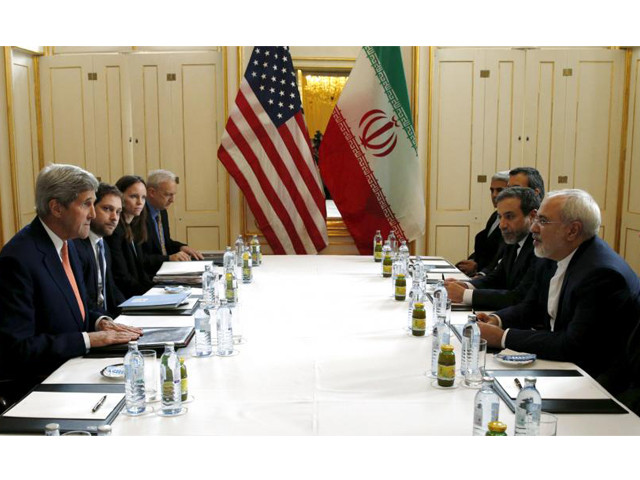‘Aggressive normalisation’
America has now imposed further sanctions on Iran by way of castigation for a ballistic missile test

US Secretary of State John Kerry (L) meets with Iranian Foreign Minister Mohammad Javad Zarif on what is expected to be "implementation day," the day the International Atomic Energy Agency (IAEA) verifies that Iran has met all conditions under the nuclear deal, in Vienna January 16, 2016. PHOTO: REUTERS
Barack Obama is in the last year of his presidency, a presidency that has had warmer reviews outside America than within, where it is seen as further polarising an already polarised country and unlocking the paranoia and vulnerability of the American right wing. He has failed on key promises made in his first term — Guantanamo is still open — but pulled America out of messy wars in Iraq and Afghanistan. And he has done a deal with the Iranians. The Americans did not do it alone, there was a coalition of states working together for a common goal, and the potential consequences reach far horizons. The deal will probably be the defining item in the Obama legacy — and potentially the most contentious.
Above all else, the deal is a triumph for multilateral diplomacy. A seemingly intractable problem has been if not solved then mitigated to the point at which tensions can be relaxed. This does not mean guards lowered, but Iran has displayed sufficient compliance with the terms of the agreement for there to be general agreement that it is within the parameters of compliance that would trigger a lifting.
It is less than a year since the deal was signed in Vienna and events are moving swiftly. Iranian markets, including those for oil and natural gas, are again open. Iranian oil can be sold on the spot market once again, which in itself may be a mixed blessing as oil is at a low, dipping below $30 a barrel over the last weekend. Inwards investment can re-boot, and there will be no shortage of governments and international companies that will want to get a slice of Iranian business. Banking, transport and tourism will all benefit, and $100 billion will be unfrozen and go back into the Iranian economy.
Not everybody is happy to see Iran once again be a mover-and-shaker globally, with Saudi Arabia and Israel vocal in their dissatisfaction. Israel has been particularly vociferous; stung by what it sees as a deal — and a presidency — that has paid scant attention to its demands. For Saudi Arabia, currently in a proxy war with Iran, there is little enthusiasm either, and with the Saudi economy under pressure from the drop in oil prices, the kingdom is not going to view with equanimity the re-rising of another oil-based economy that before the imposition of sanctions supplied one-in-five of all the barrels of oil shipped to the European Union. Stock markets have already tumbled in New York, London and Tokyo at the prospect of yet more oil entering an already flooded market, and the potential for the triggering of yet more instability as a result of this in the Middle East and the Arabian Peninsula cannot be underestimated.
For Pakistan, the lifting of Iranian sanctions removes a significant impediment to the development of a range of projects, principally in the energy sector, that have Iran at their core. The threat of American sanctions against Pakistan has itself been removed by the removal of the Iranian sanctions, and given that Iran has already signalled that it is seeing China as a vital player — and partner — in the region in the future, there is a widespread and welcome outbreak of optimism.
Theoretically, it could all fall apart. But the world is a very different place from what it was when Americans were held hostage in their embassy in Tehran. Iran is different — a young, well-educated population hungry to engage with the rest of the world. And we are all just that little safer. Probably.
Published in The Express Tribune, January 19th, 2016.
Like Opinion & Editorial on Facebook, follow @ETOpEd on Twitter to receive all updates on all our daily pieces.















COMMENTS
Comments are moderated and generally will be posted if they are on-topic and not abusive.
For more information, please see our Comments FAQ